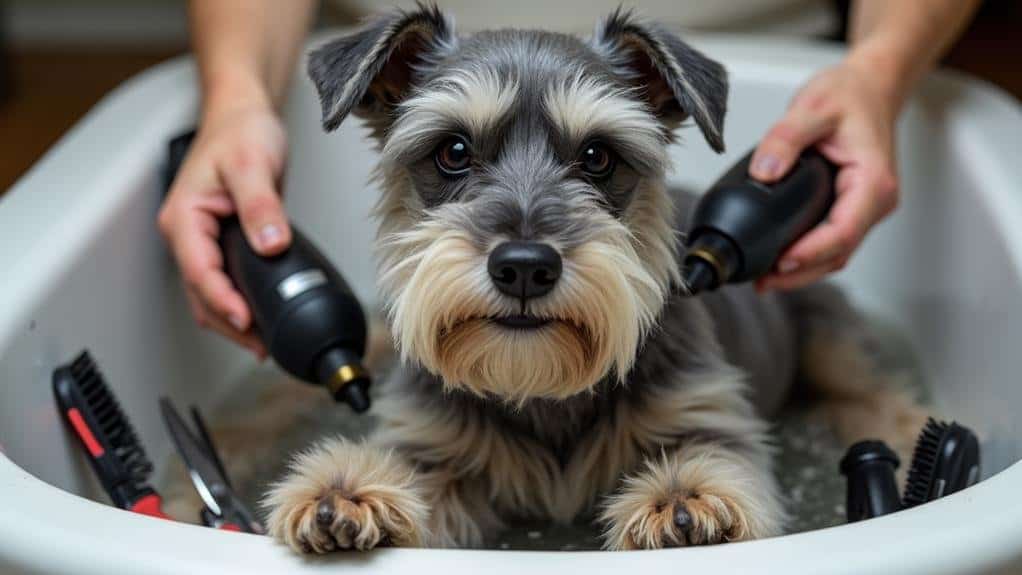While Schnauzers can be lovable companions, they're not for everyone. You'll face challenges with their stubborn nature, making training a test of patience. Their excessive barking can drive you (and your neighbors) crazy, while their high energy demands daily exercise and mental stimulation. Don't forget the grooming – it's a time-consuming and potentially costly affair. Their protective instincts might go overboard, leading to aggressive behavior if not properly managed. Health concerns and separation anxiety are also common issues. Before bringing a Schnauzer home, consider if you're ready for these potential drawbacks. There's more to uncover about these spirited pups.
Stubborn and Difficult to Train

Despite their charming appearance, Schnauzers can be a handful when it comes to training. These furry friends are notorious for their stubbornness and independent nature, which can make obedience lessons feel like an uphill battle. You'll need to bring your A-game and a whole lot of patience to tackle their training challenges.
Here's why Schnauzers can be so difficult to train:
- Creative problem-solvers: Their intelligence is a double-edged sword. While they're quick learners, they'll often use their smarts to find clever ways around your commands.
- Strong-willed tendencies: Without early socialization, these pups can develop behavioral issues that'll have you tearing your hair out.
- Sensitivity to negative reinforcement: Harsh methods won't work here. You'll need to stick to positive reinforcement techniques to keep your Schnauzer engaged and cooperative.
- Prey instincts: Good luck keeping their attention when a squirrel crosses their path! Maintaining engagement during training sessions can be a real challenge.
To succeed in training your Schnauzer, consistency is key. You'll need to stay committed to your training routine and use plenty of treats and praise to keep them motivated.
Excessive Barking Issues

From the moment you bring a Schnauzer home, you'll quickly discover their reputation as vocal watchdogs is well-earned. These pups are known for their excessive barking, which stems from their territorial instincts and alert nature.
While this might seem cute at first, it can quickly become a nuisance, especially if you live in a quiet neighborhood or apartment.
The Barking Problem:
- Constant noise: Your Schnauzer may bark at every little sound or movement.
- Neighbor complaints: You might find yourself apologizing to your neighbors more often than you'd like.
- Disrupted sleep: Say goodbye to peaceful nights if your furry friend decides to sound the alarm at 3 AM.
To tackle this issue, you'll need to focus on training and socialization. Consistent reinforcement is key to teaching your Schnauzer when it's appropriate to bark.
Don't forget about mental stimulation and physical activity, too. A bored Schnauzer is more likely to become overly protective and vocal.
High-Energy Demands

While managing a Schnauzer's barking tendencies can be challenging, it's just the tip of the iceberg when it comes to their energy demands.
These pint-sized powerhouses require a whopping 30 to 60 minutes of daily exercise for adults, and even their tiny puppies need 20 to 30 minutes. If you're a couch potato, you might want to think twice before bringing a Schnauzer home!
Here's what happens when you don't meet their high energy levels:
- Behavioral issues galore: Expect excessive barking, destructive chewing, and restlessness.
- Mental meltdown: Without proper mental stimulation, your Schnauzer might turn into a furry tornado of chaos.
- Social butterfly syndrome: These pups crave interaction, so leaving them alone for long periods is a recipe for anxiety and undesirable behaviors.
To keep your Schnauzer happy and well-behaved, you'll need to:
- Engage in interactive play daily
- Provide engaging toys to prevent boredom
- Establish a consistent routine of physical activity
- Guarantee plenty of social interaction
Intensive Grooming Requirements

Just when you thought you'd conquered the Schnauzer's energy demands, you're in for another surprise with their intensive grooming requirements.
Schnauzers aren't your typical low-maintenance pups; they come with a thick double coat that's a full-time job to manage. You'll need to become a master groomer or be prepared to shell out some serious cash for professional help.
Let's break down the grooming routine you're signing up for:
- Weekly brushing sessions: Get ready to spend quality time with your Schnauzer and a brush at least once a week to prevent matting and keep that coat looking sharp.
- Regular facial hair trimming: Those adorable beards aren't just for show – they're food particle magnets that need constant attention to avoid turning into a matted mess.
- Eye cleaning: Tear staining is a common issue, so you'll need to add eye cleaning to your daily to-do list to keep your pup looking fresh and avoid potential health issues.
- Professional grooming: Every few months, you'll need to book a spa day for your Schnauzer, which can put a dent in your wallet.
Protective Instincts Gone Overboard

Brace yourself for the Schnauzer's protective instincts, which can quickly spiral out of control if you're not prepared.
These pint-sized guardians take their watchdog duties seriously, often to a fault. You'll find yourself constantly on edge as your Schnauzer barks at every passing squirrel, mailman, or innocent pedestrian.
Their territorial nature can turn your once-peaceful home into a fortress of furry fury. Without proper socialization and training, your Schnauzer may become an aggressive menace to both strangers and unfamiliar dogs.
Imagine trying to have a relaxing evening when your pup's on high alert, ready to defend against imaginary threats!
For inexperienced owners, this protective streak can quickly lead to problematic behaviors:
- Excessive barking at all hours
- Aggressive reactions to harmless situations
- Difficulty distinguishing between real and perceived dangers
You'll need to invest significant time and effort into training to curb these tendencies.
Potential Health Concerns

Uncertainty looms over every Schnauzer owner when it comes to their pet's health. These adorable dogs are susceptible to a variety of issues that can turn your furry friend into a four-legged money pit.
Let's explore the potential health concerns that might make you reconsider your choice of canine companion:
1. Hip and Eye Troubles
Schnauzers are prone to hip dysplasia, which can lead to painful arthritis. They're also at risk for eye disorders like cataracts and progressive retinal atrophy. You might find yourself playing optometrist more often than you'd like!
2. Miniature Mayhem
If you've got a Miniature Schnauzer, brace yourself for potential pancreatitis and diabetes. You'll become best friends with your vet as you navigate these tricky conditions.
3. Dental Dilemmas
Hope you're ready to become a doggy dentist! Schnauzers need regular dental care to avoid issues that can affect their overall health. Get ready for some toothy adventures!
4. Lifespan Lottery
While Schnauzers can live 10-15 years, hereditary conditions might cut that short. It's like playing health roulette with your furry friend!
Separation Anxiety Challenges

Ever wondered why your Schnauzer turns into a furry tornado when you leave the house? It's likely due to separation anxiety, a common challenge for this highly dependent breed.
Your Schnauzer's stubborn nature can make this problem even worse, leading to destructive behaviors when you're not around.
To tackle this issue, consider these strategies:
- Regular exercise: Keep your pup physically and mentally stimulated to reduce restlessness and anxiety.
- Positive reinforcement training: Reward calm behavior and gradually increase alone time to build confidence.
- Early socialization: Expose your Schnauzer to various situations and people to develop a balanced temperament.
Remember, Schnauzers are social creatures who crave human companionship.
Without proper management, they may vocalize excessively, causing noise complaints from neighbors. This can be especially problematic in apartments or close living situations.
Frequently Asked Questions
Are Schnauzers Bad Dogs?
Schnauzers aren't inherently bad dogs. They're energetic and require lots of exercise, training, and socialization. If you're willing to invest time and effort, you'll find they're loyal, intelligent companions. Their needs might be challenging for some owners.
What Are the Behavior Problems With Schnauzers?
You'll find Schnauzers can be aggressive toward strangers, stubborn during training, and prone to excessive barking. They're also territorial and may develop aggression towards other animals. Without proper exercise and stimulation, they can become destructive and anxious.
Are Mini Schnauzers Aggressive?
While Mini Schnauzers aren't inherently aggressive, they can display aggressive behavior if not properly socialized. You'll need to invest time in early training and positive reinforcement to prevent territorial tendencies and guarantee your pup develops a friendly, well-adjusted temperament.
How Difficult Are Schnauzers?
Schnauzers can be quite challenging. You'll face their stubborn nature during training, need to provide plenty of exercise, and manage their tendency to bark excessively. Their intelligence and grooming needs also add to the difficulty of owning one.
Conclusion
While Schnauzers can be challenging, they're not inherently "the worst" dogs. You'll need to weigh their quirks against their positive traits. If you're up for a loyal, intelligent companion and don't mind some extra work, a Schnauzer might still be a great fit. Remember, every dog is unique, and proper training and care can mitigate many issues. Ultimately, the best dog for you depends on your lifestyle, preferences, and willingness to meet their specific needs.

